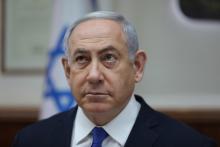Politics of Israel
Erdogan cancels visit to Israel: “Hamas is not a terrorist organization, but a group of liberators”
The Turkish president attacked Israel and Netanyahu, saying: “The West may owe you a lot, but Turkey owes you nothing, the Israeli president abused our goodwill”
Israel's Netanyahu pauses judicial reform that split nation
Israeli Prime Minister Benjamin Netanyahu on Monday night paused a judicial overhaul that triggered a general strike, political division and mass protests in the country's most severe domestic crisis in years.
The proposed reforms would curtail the authority of the Supreme Court and give politicians greater powers over the selection of judges.
They took to the streets, the capital's completely blocked PHOTO/VIDEO
Holding an Israeli flag, key anti-reform protest organizer Shikma Bressler led tens of thousands of demonstrators outside the Knesset, chanting: "We will not give up!", The Times of Israel reported.
Bressler was arrested at protests last week and later released.
Israel’s democratic process is a democracy at work
Ever since Israeli Prime Minister Benjamin Netanyahu took over, both he and his coalition partners as well as the country itself have come under unprecedented and vicious attacks, with accusations of radicalism, right-wing extremism and apartheid being thrown their way without any evidence and without any due process, let alone facts.
- Read more about Israel’s democratic process is a democracy at work
- Log in to post comments
Israelis press on with protests against new government
Tens of thousands of Israelis gathered in Tel Aviv on Saturday night to protest plans by Prime Minister Benjamin Netanyahu's new government to overhaul the judicial system, measures that opponents say imperil the country's democratic foundation.
Israeli media, citing police, said some 100,000 people were out protesting.
Thousands of Israelis rally against Netanyahu government
Tens of thousands of Israelis gathered in central Tel Aviv on Saturday night to protest plans by Prime Minister Benjamin Netanyahu's new government to overhaul the legal system and weaken the Supreme Court — a step that critics say will destroy the country's democratic system of checks and balances.
As Israel heads back to elections, Lapid stakes out vision
Israel's parliament voted Thursday to dissolve itself, triggering the country's fifth election in just over three years and thrusting veteran politician Yair Lapid into the role of interim prime minister as he tries to persuade a deeply polarized nation to embrace his centrist vision.
Türkiye and Israel launch work to exchange ambassadors
Türkiye and Israel have decided to start works for upgrading the level of mutual diplomatic representation by appointing ambassadors in a most concrete step of the joint efforts to normalize the bilateral ties.
Israel’s Lapid begins 'historic' UAE trip
Israel's top diplomat Yair Lapid on June 29 began the first-ever official visit by an Israeli minister to the United Arab Emirates, after the two nations normalized ties in September.
- Read more about Israel’s Lapid begins 'historic' UAE trip
- Log in to post comments
The opposition agreed; Netanyahu without a new mandate due to a man from the Balkans
Leaders of the far-right Yamina and centrist Yesh Atid, Naftali Bennett and Yair Lapid, and Ra''am (United Arab List) chairman Mansour Abbas have reached an agreement on a unity government whose deadline was midnight local time.
In a statement on Twitter, Lapid said that he informed the president of the country about the agreement.









